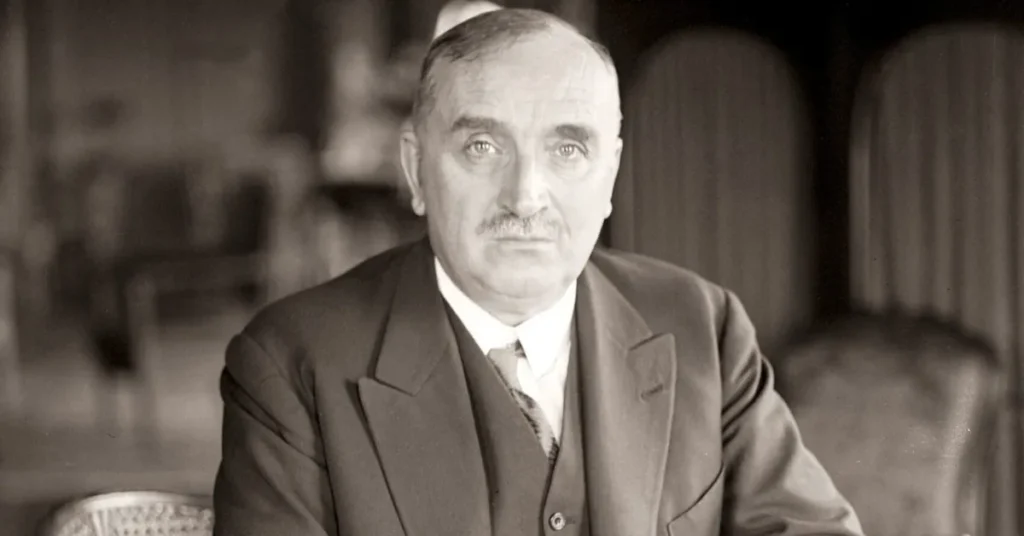(彼らは貧しい。しかし、高貴である──ポール・クローデルの日本との出会い)
This article explores Paul Claudel’s deep encounter with Japan—his admiration for its dignity, resilience, and spirit. Nearly a century later, his reflections still invite us to ask: what makes a nation truly noble?

Portrait of Paul Claudel, French diplomat and poet, who served as ambassador to Japan in the 1920s and later described the Japanese people as “poor, but noble.”
Introduction
Paul Claudel (1868–1955) was both a distinguished French diplomat and a celebrated poet-dramatist. His career took him across the globe—from the United States to China, Brazil, and Europe—but one destination held a special place in his heart: Japan.
From childhood, Claudel had been captivated by Japanese art. Introduced to Hokusai and Utamaro by his sister, he felt an irresistible pull toward the culture that produced such works. This fascination inspired him to excel in his studies, win first place in France’s diplomatic examinations, and pursue a career that eventually brought him, after decades of service, to Tokyo as French ambassador from 1921 to 1927.
For Claudel, arriving in Japan was not just another posting. He described it as “the highest honor,” because he saw Japan as a civilization that embodied both a great past and a great future. Unlike many nations that modernized by discarding their traditions, Japan had managed to adapt to the modern age while remaining rooted in its ancient heritage.
It was this unique blend of tradition and modernity that Claudel set out to observe—and which would leave him with impressions profound enough to echo through his later writings and speeches.
Facts and Observations
One of Claudel’s most vivid experiences came during the Great Kantō Earthquake of 1923. As ambassador, he walked for hours between Tokyo and Yokohama and later recorded with astonishment that he never heard a single cry of rage. Even those trapped under the rubble pleaded not with shouts of desperation but with quiet humility: “Please… please.”
Such restraint moved him deeply. For a European accustomed to seeing disaster unleash panic and violence, the dignity of the Japanese in tragedy revealed something essential about their civilization.
Claudel’s recognition of this spirit echoed in his later work. In 1934, he wrote Joan of Arc at the Stake, celebrating the courage of an uneducated village girl who rose to defend her country. Though drawn from French history, its themes of sacrifice and nobility resonated strongly with what Claudel had witnessed in Japan. The play was hailed as one of the greatest theatrical works of the twentieth century.
Even during the Second World War, when France and Japan stood on opposite sides, Claudel declared: “There is one people I cannot bear to see perish. They are the Japanese. They are poor, but noble.” His words were remarkable not only because Japan was technically an enemy state, but because they expressed a conviction that Japan’s ancient civilization embodied a dignity worth preserving for all humanity.
Thoughts and Interpretation
Paul Claudel’s reflections on Japan reveal more than admiration for a foreign land; they highlight a vision of civilization itself. What moved him was not Japan’s wealth or military capacity, but the way its people carried themselves—with humility in hardship, with dignity in suffering, and with an unbroken thread of cultural memory that reached back to antiquity.
For Claudel, this was proof that greatness does not depend on material abundance. A people may be poor in possessions, yet noble in spirit. He contrasted this with the turbulence of Europe, where revolutions and wars often tore societies apart. Japan, by contrast, seemed to embody resilience through harmony: a nation capable of absorbing modern change without discarding its moral foundation.
Claudel’s perspective also challenges us today. In a world where nations often seek power at the expense of principle, his praise reminds us that true strength lies in integrity, not domination. Japan’s example—modernizing while preserving a sense of spiritual nobility—suggests that progress is not simply a matter of technology or economy, but of how a people choose to live together.
In this sense, Claudel’s statement, “They are poor, but noble,” was not condescension but recognition: a tribute to a civilization whose worth could not be measured by wealth or empire, but by the resonance of its spirit.
Conclusion
Paul Claudel’s words still echo across time: “They are poor, but noble.” What he witnessed in Japan nearly a century ago remains a reminder that the true wealth of a nation is not measured by its armies, its industries, or its treasures, but by the spirit of its people.
Japan’s ability to modernize while honoring its ancient traditions offered Claudel—and offers us—a model of balance. It shows that progress does not require abandoning dignity, and that hardship can be met with humility rather than despair.
In an age when global power is often equated with dominance, Claudel’s testimony stands as a counterpoint. He saw in Japan a civilization whose worth was rooted in harmony, resilience, and noble conduct. That recognition is not only a historical curiosity; it remains a challenge for us today. Can we, too, create societies where the measure of greatness lies not in possession, but in the resonance of spirit?
[Author’s Note]
Writing about Paul Claudel’s encounter with Japan, I am struck by how his words still resonate with questions we face today. His admiration was not for wealth, conquest, or power, but for the dignity with which ordinary people carried themselves—even in disaster.
When he said, “They are poor, but noble,” he was not offering pity but recognition. He had seen, firsthand, a people who preserved courtesy in crisis and harmony in hardship. For Claudel, that was the mark of true civilization.
As I reflect on his testimony, I cannot help but feel that his words are also a mirror for us. Do we still live with that nobility of spirit? Do we measure progress by possessions, or by the resonance of our shared humanity? Claudel’s voice, across time, urges us to choose the latter.


